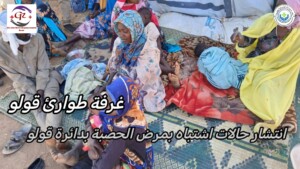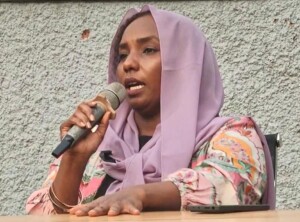Prices soar across Sudan as coronavirus measures bite
Commodity prices are soaring as precautions against coronavirus (Covid-19) impact on daily life in Sudan. The Federal Government has directed state governors to act immediately to facilitate the movement of goods to ensure the smooth flow of commodities and other goods in all states of Sudan.
 El Fasher market (File photo)
El Fasher market (File photo)
Commodity prices are soaring as precautions against coronavirus (Covid-19) impact on daily life in Sudan. The Federal Government has directed state governors to act immediately to facilitate the movement of goods to ensure the smooth flow of commodities and other goods in all states of Sudan.
The National Security and Defence Council announced a dusk-to-dawn curfew from 8 pm to 6 am came into effect across Sudan at 8pm on Thursday until further notice. The new precautions against the spread of the coronavirus epidemic also include a shut-down of public transport to limit travel. All bus traffic to the states also stopped on Thursday evening.
On Friday, Radio Dabanga carried out a survey among the public regarding the impact of the new measures on food and fuel prices in Darfur, Kordofan, Sudan’s Northern State, Blue Nile, as well as eastern Sudan and Khartoum.
People from different states said that commodities are available, however, the prices are soaring and in some cases have doubled. “For instance, there is scarcity in flour and fuel,” they said. Some attributed the availability of commodities in the markets to the inability of most people to purchase and store them as the majority are daily workers with limited incomes.
Some merchants and small business owners complained of stagnation, recession because of lack of custom. “Most people buy specific things related to the necessary daily needs such as food and drink,” they said.
Darfur
The prices of consumer goods and fuel have soared in North Darfur because of the restriction of movement of goods and people between El Fasher and other localities.
Some people in Darfur, especially those in villages and nomads, complained about the impact of the new measures. They said that the decisions have paralysed their movement and affect their interests because they primarily depend on the weekly markets and capital city for goods supply. “We supply big towns and cities with vegetables, fruits, or firewood and in return, we get some goods and other necessities,” they said.
In Central Darfur, people complained about the rapid increase in food and fuel prices.
The coordinator of the Central Darfur camps for the displaced, El Shafee Abdallah told Radio Dabanga that after the World Food Programme (WFP) reduced the food rations in the camps, people resorted to seek work in the town to provide for their families.
"The recently imposed curfew has limited the movement of the people and that affected their income, we need urgent help,” Abdallah said. He called on the government, the WFP, and other humanitarian aid organisations to provide help for the people in the camps.
Khartoum
In Khartoum, the recently imposed measures affected the movement of people, particularly, those who are travelling to other states or localities because of the shortage of public transport.
Journalist Hussein Saad told Radio Dabanga that there is noticeable overcrowding of travellers in the main bus stations due to the scarcity of buses and unaffordable prices. “Some vendors and vegetable dealers complained about the decline in sales while there is the availability of consumer goods, but no demands,” he concluded.
Kordofan
In West Kordofan, the recently imposed measures have especially affected those with limited incomes. Residents told Radio Dabanga that they appreciate the new measures, but they think it is difficult to implement them, especially for the daily workers and low-income people.
Many people who want to go to their families, but they face some difficulties to travel because of the high prices of tickets and the scarcity of transportation.
In South Kordofan, the decision has greatly contributed to the high price of tickets between cities and areas within the towns. Residents told Radio Dabanga from Habila that the precautionary measures regarding the fight against Coronavirus have had a greater impact on transportation.
In North Kordofan, the prices of basic commodities in El Obeid markets have significantly soared after the new measures were announced.
El Gedaref
People complained about the rapid increase in prices of commodities in El Gedaref. Some residents attributed the high prices to the panic and high demands of people to purchase as many goods as they can, and thus business owners exploited the situation and raised the prices.
Also, in Northern State people claimed that the new measures have had a huge impact on the prices of commodities.
The Federal Government directed the states’ governors to act immediately to facilitate the movement of goods to ensure the smooth flow of commodities and other goods in all states of Sudan.
In a press statement on Friday, Dr Yousef El Dei, Minister of Governance told Sudan News Agency (SUNA) that the precaution measures taken against the spread of coronavirus should not hinder the supply chain of goods. He said that they addressed the authorities in the states to make sure that the new measures must not be used as a pretext to impede the movement of goods.
He said that some people tried to take advantage of these exceptional situations to work to hinder the movement of goods and people.
Radio Dabanga’s editorial independence means that we can continue to provide factual updates about political developments to Sudanese and international actors, educate people about how to avoid outbreaks of infectious diseases, and provide a window to the world for those in all corners of Sudan. Support Radio Dabanga for as little as €2.50, the equivalent of a cup of coffee.












 and then
and then